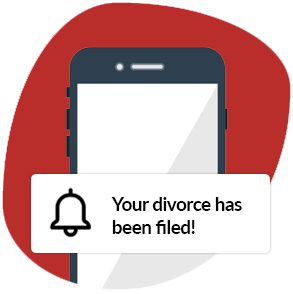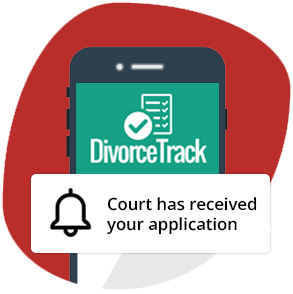How Easy Is It To Get Divorced?
Getting a divorce in England and Wales is fairly easy provided your situation is amicable.
On April 6 2022, the divorce law changed to make way for a no-fault divorce. This was the biggest shake-up to divorce laws in 50 years.
You no longer need to prove fault (such as adultery or unreasonable behaviour) to get a divorce. Instead, you can simply state that the marriage has irretrievably broken down.
Our solicitor’s guide to no-fault divorce is useful when deciding whether to do it yourself or choosing between a sole and joint application for divorce.
There are three ways of applying for divorce, each of which has varying degrees of ease and cost associated with it.
Here are the three options:

01
💻 Do-it-yourself divorce – Getting a divorce through traditional local solicitors can involve visiting their offices or dealing with a receptionist to obtain your information. With our service, everything is done online making it more streamlined and easier for you. There’s no need to attend our offices or speak with receptionists – just complete a simple online form.
02
🤳🏽 Online Divorce – Family law solicitors aren’t traditionally known for being efficient. There is more bureaucracy, and more hoops to jump through to speak with your solicitor. With Divorce-Online, our team is on hand throughout and we typically submit your divorce application within 24 hours of receiving your details.
03
📲 Solicitors – Getting updates on your case from local solicitors can be time-consuming. Secretaries getting information and then calling you back later. We send you specific updates throughout your case, which you can read from your phone or laptop. We’re proactive in our communication, not reactive!
The Requirements For An Easy Divorce
An easy divorce is desirable but not always straightforward, especially when it comes to dividing family finances.
Opting for a DIY Divorce
While anyone can choose a DIY divorce or dissolution, it’s not always suitable for everyone.
Consider handling your divorce or dissolution and financial arrangements independently if:
- You don’t have children or can amicably arrange child custody and support.
- Both of you have resided in the same part of the UK for at least a year.
- You can communicate effectively to negotiate the division of assets and liabilities.
Agreement on Divorce or Dissolution
If you both agree to proceed with a divorce or dissolution, the following conditions must be met:
- In England and Wales, you must have been married for over one year.
- In Northern Ireland, you must have been married for over two years and lived apart for the same duration.
When an Online Divorce May Not Be Suitable
An online divorce may not be appropriate if you and your ex-partner face the following issues:
- Complex financial negotiations
- Disagreements about legal jurisdictions
- Ownership of businesses or overseas property
By assessing these factors, you can determine the best approach to achieving a smooth and manageable divorce process.
How To Get An Easy Divorce with Divorce-Online
1
Complete a simple online form
To make applying for divorce simple, we ask you to complete a simple online form with details of your marriage.


2
Speak with your case manager
Once we have received your information, you can speak with our team and start the divorce application.
3
File for divorce
Your case manager will submit your divorce application to the court and start divorce proceedings. You can then track your divorce from a phone or laptop.


4
Track the progess from your phone or laptop
Once we have received your information, you can speak with our team and start the divorce application.
Important Things To Know About Divorce
Here’s what you need to know before getting started with a divorce:
- It takes a long time. Reading some websites, you can be forgiven for thinking divorce is quick. In reality, it’s slow and boring for most people. The new no-fault divorce process includes a mandatory waiting period of 20 weeks. Overall, 26 weeks is the absolute quickest a divorce can finalise. As well as going through the legal procedure to end your marriage, you will likely have children and housing arrangements to make. For a realistic timeline, read our guide on how to get a quick divorce.
- It’s not just one process, but usually three. Having a Final Order granted is only one part of the overall picture when it comes to divorce. This court document ends your marriage, but it doesn’t address children’s arrangements or your finances. To legally separate your money and assets, you must make a separate application to the court. A solicitor needs to draft what is known as a consent order, which is submitted to the court. Child arrangements and support are dealt with separately from the divorce procedure. These are the three different processes that need to be dealt with separately but often happen at the same time.
- Going to court should be the last resort. Hiring solicitors is not just very expensive, but it also adds to the complexity of divorce and increases the chance of conflict. You should always try and agree on as much as possible between you before getting solicitors involved. Mediation can be a cheaper and more amicable route to reaching a fair divorce settlement.
- You’re very unlikely to need to attend a court hearing. Many couples are worried about having to attend court, but in reality, very few couples will need to. Around 1% of cases end up in court. These cases are usually couples with a high net worth who cannot agree on who gets what.
- You need to address your assets. There is no set formula for working out who gets what in a divorce. The laws around dividing assets in a divorce are vague, which makes dealing with your finances more complicated. The starting point will be 50/50, but reaching an agreement that is fair and equitable doesn’t mean everything is shared equally.
FAQs about getting an easy divorce
We appreciate that going through a divorce is often stressful and difficult. Here are some common questions about divorce to help get you started.
Is divorce easier if both parties agree?
Yes, divorce is generally easier and faster if both parties agree under the new no-fault divorce law. The process is streamlined because both parties can simply state that the marriage has broken down irretrievably without needing to cite specific reasons like adultery or unreasonable behaviour.
When both spouses agree to the divorce, the process is smoother and avoids lengthy legal battles. It allows you to reach a financial settlement and discuss other important things, such as child arrangements and support.
Couples can now make a joint application for divorce, which further simplifies the process if both parties agree. Providing that parties respond to the court efficiently, a joint divorce application can be the easiest way to get divorced.
Can you get a divorce if one party doesn’t want to?
Yes, you can still get a divorce even if one party doesn’t want to under the no-fault divorce law.
One spouse can now file a divorce application without the other spouse’s consent. Previosuly, couples had to be separated for 5 years before they could divorce without the consent of their spouse.
There is a mandatory 20-week reflection period from the start of proceedings to the conditional order (formerly decree nisi), which provides time for both parties to consider their decision. After the reflection period, the applicant can proceed to apply for the conditional order and, six weeks later, the final order (formerly decree absolute), finalising the divorce.
Can divorce be ‘easy’ if we have finances to divide?
Divorce can still be relatively straightforward under the no-fault divorce law, even if there are finances to divide, provided both parties agree on the division. Key factors include:
- Financial Disclosure: Both parties must fully disclose their financial situation.
- Consent Orders: Agreements on how to divide assets can be formalised through a consent order, which the court must approve.
- Mediation: Mediation can help resolve disputes over financial matters amicably.
If there are significant disputes over finances, it can complicate and prolong the process, potentially requiring court intervention.
Does having children make getting a divorce more difficult?
Having children can make the divorce process more complex due to the need to address child arrangements, but the no-fault divorce law aims to simplify the overall process.
It’s worth knowing that the divorce procedure does not include children’s arrangements. Therefore, you can get a divorce with children even if there are disputes.
Decisions about where the children will live and how time will be shared between parents must be agreed upon or decided by the court.
Agreements on financial support for the children need to be made, either mutually or through the Child Maintenance Service.

Managed Divorce Online
- Divorce papers are drafted for you
- The divorce process is managed on your behalf
- Track your divorce online, from start-to-finish
- We handle any queries from the judge for you
The ideal service for people who want to have a simple, affordable, and hassle-free divorce.
